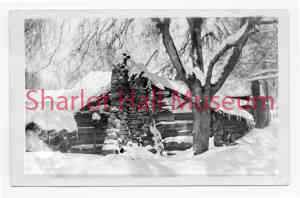(Condensed from an article written by Sharlot M. Hall, founder of Sharlot Hall Museum, that first appeared in the Prescott Courier on December 24, 1930.)
 Counting miners, soldiers, pack-train owners and all, there might have been two or three hundred men in reach of Prescott that Christmas season -- that late December of 1864. There were half a dozen families, mostly with several children; most of them arrived in October on a California-bound train and decided to try their fortune in Arizona instead of going on further west.
Counting miners, soldiers, pack-train owners and all, there might have been two or three hundred men in reach of Prescott that Christmas season -- that late December of 1864. There were half a dozen families, mostly with several children; most of them arrived in October on a California-bound train and decided to try their fortune in Arizona instead of going on further west.
Through the window shutters of whip-sawed boards the light of fire-place or candles filtered out to cheer late travelers. There was not a glass window in Prescott that year, not even in the Governor’s "Mansion." But there was Christmas cheer even if no windows reflected it. Big fires burned in the fire-places of stone or ‘dobe or "stick an’ mud"; good smells came up from the camp fires on the plaza.
Every home opened its door to as many guests as it would hold and the governor reckoned his guests by the dozen. Not many men had to eat Christmas dinner at the little cabins where Lois Boblett and Mrs. Osborne served their patrons – though the fare must have been much the same everywhere.
Young Sam Miller and other men made a business of hunting for the market and any man who cared to go a mile could shoot a deer or wild turkey. Bear and antelope and grouse and quail, and even beaver tail, could be added to the bill of fare with little effort – and yet beef from some discarded work ox was a prime delicacy and likely as not the governor himself was glad to get a quarter.
Flour was scarce and most of it came by jack mule from Mexico, along with cakes of dark brown sugar and dried figs and grapes. Dried apples and peaches had come with the October train that brought the women and children, and a few of the women had hoarded a bit of white flour and white loaf sugar, kept for sickness but used in the Christmas jollification.
Those pioneer women were notable cooks and there must have been many a tempting dinner served; but the governor’s private secretary, Henry Fleury, had just enough French blood to cook with genius, and visitors of that period to Arizona’s state house have ranked the broad-shouldered, handsome secretary-cook above the big and handsome governor.
Brown Mexican beans, and the little white "Navy" beans included in the regular rations of the soldiers, were the available vegetables – with plenty of "sow-belly" and chili sauce to season them – though all of these grew scarce as winter shut down and from "Walker’s Camp" and Wickenburg volunteer packers made their way to Mexico for supplies.
No doubt the gray and grizzled Captain (Joseph) Walker was among the guests in the governor’s log house that day, and it may well be that he and Captain (Pauline) Weaver sat side by side and talked of the fur trade in the Thirties and Forties, when they were young men and pushed their way to Santa Fe and on into California far in advance of (John C.) Frémont and (Stephen Watts) Kearny.
Bright uniforms, too, mingled with the dark coats around the governor’s table that Christmas Day, for the commander of the small "army" lived at the "Mansion" with the jolly crowd of officials, and the military band played for the ball that night – when the dancers found the floor of hard-beaten earth no bar to their fun.
This was the first ball at which there were women enough left for a full set and some left over; little girls danced with grave and dignified officers whose tall shoulders were far above the pig-tailed heads of their little pardners, and one little girl told of how she carried her Christmas doll in one hand while she danced.
whose tall shoulders were far above the pig-tailed heads of their little pardners, and one little girl told of how she carried her Christmas doll in one hand while she danced.
There were gifts, even though stores were far away; gifts mostly home-made, but treasured for years and even in a few instances handed down to the present. There was a little service of song and homely talk in the home of Mrs. Ehle, who lived to be the beloved "Grandmother Ehle" of later day Prescott, and another at the mansion with Parson (Hiram W.) Read, the first minister in Prescott, in charge.
The next year (1865) Christmas at the governor’s mansion had the greatest distinction in the life of that old house, for the [second] governor’s lady of Arizona (Margaret McCormick) was hostess to all the little city. Her lovely and gracious spirit still lingers in the big rooms and keeps Christmas memories sweet and fragrant as boughs of pine and cedar.
“Days Past” is a collaborative project of the Sharlot Hall Museum and the Prescott Corral of Westerners International (www.prescottcorral.org). This and other Days Past articles are also available at www.sharlothallmuseum.org/library-archives/days-past. The public is encouraged to submit proposed articles to dayspastshmcourier@gmail.com. Please contact SHM Library & Archives reference desk at 928-445-3122 Ext. 14, or via email at dayspastshmcourier@gmail.com for information.


